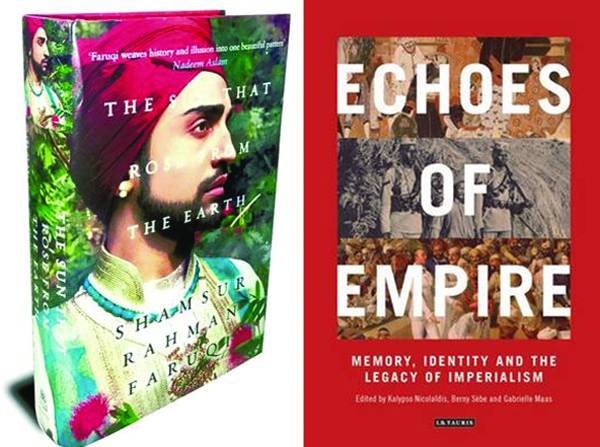
The Eye Still Seeks: Pakistani Contemporary Art
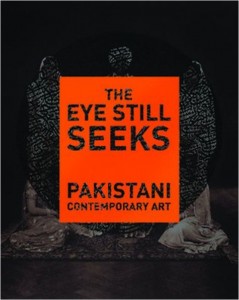
Ed. Salima Hashmi
Penguin Studio [hardback], 2015
PRs 9,995
In this glorious collection of essays on Pakistani artists by Pakistani artists, Kamila Shamsie writes about Naiza Khan and her engagement with the female figure and Mohsin Hamid disassembles the work and persona of Rashid Rana in his ingenuous essay “A Film about a Conversation about Rashid Rana”. Mohammad Hanif tries to pin down the slippery mythology of Karachi, venturing out in search of a painter who lives in a tree and tracing conversations with the late Asim Butt. Naazish Attaullah pays tribute to the enigmatic Anwar Saeed. Aisha Khalid and Imran Qureshi converse with each other on life and inspiration, and Quddus Mirza, Nafisa Rizvi and Salima Hashmi look closely at contemporary artists from Pakistan.
From the book: “What was I going to ask him? Why do you live inside a tree? What if he asked me why I didn’t live inside a tree? What if he asked me if I could recommend a better tree to live in? When I decided that I needed to ask him some questions about his wall and tree work, I thought I should visit him in the morning, have some questions ready, make it sound like work... I thought maybe I should take an offering of paints and brushes.” (Mohammad Hanif, “His Were the Streets”).
The Sun That Rose from the Earth
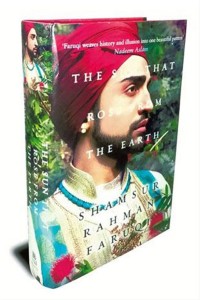
Shamsur Rahman Faruqi
Hamish Hamilton [hardback], 2014
PRs 1,595
A young Rajput orphaned by the revolt of 1857, Beni Madho Ruswa travels many years later from Cawnpore to Delhi to have his copy of the divan of Mirza Asadullah Khan Ghalib autographed by the great poet himself. Young Mir Taqi Mir, a rising star in the world of poetry, meets the first great love of his life, Nurus Saadat, an exquisite beauty from Isfahan. A tumultuous love affair follows, accompanied by ravishing verse. Aspiring poet and wealthy businessman Darbari Mal Vafa pays a visit to Lucknow and learns of the life and work of the poet Shaikh Mushafi through the stories told by his widow. Poets and historical figures ranging from Ghalib, Mirza Jan-e-Janan, Budh Singh Qalandar, and Amir Khan Anjam to Mir, Kishan Chand Ikhlas, Haidar Ali Atash and Mushafi occupy centre-stage in this fabulous collection of stories, set in the great cities of northern India and spanning the glittering age of the Mughals.
From the book: “Oh, how could I ever describe the form and figure of Mirza Ghalib! […] A bright, no, a luminant and smiling visage; his eyes were large, and perhaps because of the onset of a little effect of the wine, they inclined to a little redness, making them even more beautiful; in spite of the effect of the wine, his eyes shone with intelligence, alertness and sharpness of acumen.”
Echoes of Empire: Memory, Identity and Colonial Legacies
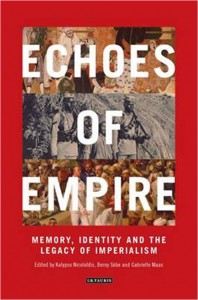
Ed. Kalypso Nicolaidis, Berny Sebe, Gabrielle Maas
I B Tauris [paperback], 2015
PRs 3,310
How does our colonial past echo through today’s global politics? How have former empire-builders sought vindication or atonement, and formerly colonized states reversal or retribution? This groundbreaking book presents a panoramic view of attitudes to empires past and present, seen not only through the hard politics of international power structures, but also through the nuances of memory, historiography and national and minority cultural identities.
Bringing together leading historians, political scientists and international relations scholars from across the globe, Echoes of Empire emphasizes Europe’s colonial legacy while also highlighting the importance of non-European power centres – Ottoman, Russian, Chinese, Japanese – in shaping world politics, then and now. Echoes of Empire bridges the divide between disciplines to trace the global routes travelled by objects, ideas and people and forms a radically different notion of the term ‘empire’ itself.
What people are saying: “The most wide-ranging and impressive effort to date to analyse the after-life of modern European empires” (Dipesh Chakrabarty).
“An inspiration to those who want to end the West-versus-the-Rest divide and build a truly inclusive field of global IR” (Amitav Acharya).
City of Spies
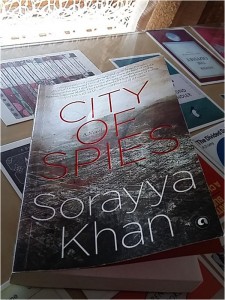
Sorayya Khan
Aleph Book Company [paperback], 2015
PRs 570
It is the summer of 1977 and Pakistan swelters in the unrelenting heat. Weeks after her eleventh birthday, Aliya Shah wakes up to the news that there has been a coup d’état, General Zia has taken over the country and Prime Minister Zulfikar Ali Bhutto is in jail. Although the shadow of the general and his increasingly puritanical edicts threaten to disrupt their comfortable existence, life goes on for Aliya much as before as she attends the American School in Islamabad. However, when a much-loved young boy, the son of the family retainer, dies tragically in a hit-and-run accident, her world is turned upside down, especially when she discovers the terrible secret of the murderer’s identity.
This coming-of-age story explores Aliya’s conflicting loyalties and her ongoing struggle to make sense of her world. Set in Islamabad and Lahore, City of Spies is a gripping novel that unfolds over 30 months in Pakistan’s tumultuous history.
From the book: “My father handed me the newspaper he was holding and said, ‘Have you seen this?’ fully aware that I couldn’t have. Below the large bold print of the heading, Pakistan Times, the newsprint was missing. ‘This is censorship.’
Lehla groaned from the other room where she lay with a sheet over her face and complained about early mornings and loud voices.
‘There has been a coup,’ my father said after a moment. ‘The prime minister is in custody and martial law has been declared.’
Martial law sounded like the Marshall Plan I’d learned about in school, but clearly it wasn’t the same thing. I studied the Pakistan Times, noticing the formal portrait of a military general splashed across the page. The general’s eyes were cast down, as if he were posing reluctantly, like a Pakistani bride. He had a bushy moustache and sleepy eyes and a row of medals pinned across his shoulders.”

